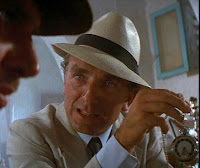"The only true wisdom comes from knowing you know nothing"
-Some guy in 'Bill and Ted's Excellent Adventure'
I finally GET dark matter. I had heard the term for years in the context of bad sci-fi and good Nova episodes, but it never really clicked for me what that term meant. Thanks to some free time and the wonders of a show called The Wonders of The Universe, I now feel pretty certain I get what the mystery is all about.
If you know how big the earth is, and you know how big the moon is, you can use that information to predict certain things about how the two bodies will orbit around one another. It's just mass and math. OK, saying 'just' makes it sound simpler than it really is, but still, it's something we've known as a species for a few hundred years now and it helps us figure out predictable stuff like, eclipses and planetary location and other kinda useful stuff. If you scale that math up a stage, it still makes sense - the Sun and the planets and the nearby stars are all behaving like this. Mass and math. The problem comes when you scale it up ANOTHER stage. When we take all the stars and dust and crap that we see in a galaxy and try to predict how fast that thing should be spinning, we're wrong. So we work backwards and say, OK, if we can figure out how fast the thing is spinning, then we should know how much stars and dust and crap and matter there is.
What that math tells us, apparently, is that based on how fast galaxies are spinning all the stars and dust and crap that we can see - all of the MATTER that we can detect - makes up only about 15% of the mass of a galaxy. The rest... Dark Matter.
Dark Energy is the same sorta thing - we know what the math SHOULD be, but then the stuff we observe out there in the world shows us something different.
What does this all mean? Well, it's all another example of the limits of knowledge. I often think about this. The limit of what is knowable. Usually, I think about it in historical terms - someone in the past knew something important and wrote it down in a scroll or a book or a papyrus, but that scroll or book or papyrus was lost or burned or whatever and now we can never know. It's like the pocketwatch Belloq shows Indy in Raiders, only no one ever finds the watch. History is actually littered with many such examples, but there are many smaller examples of the unknowable in our day to day experience. You might see initials carved into a tree while on vacation. You will probably never be able to find out who carved them, when or why. Your time of exposure is just to small, your means of investigation just to limited.
There are things we may want to know, but never will, and the mechanism by which each of us copes with that fact is what we call our 'belief system'.
Traditionally, the unknowable has been given over to the divine. Whatever manifestation it takes, it's a catch-all for everything that lay beyond our explanation. I grew up thinking of it in monotheistic terms, but just as many people have some kind of trinity in mind when they think about it. Other cultures see it in terms of shamanistic magic or a pantheon of gods and goddesses, but the purpose of all this seems the same: to contextualize the inexplicable.
But the inexplicable doesn't stay there. As each generation builds on the work of the previous and as our time of exposure grows and our means of investigation become less limited, unknowable things become known and new things are discovered which will remain unknowable for generations, or maybe forever.
So how do you contextualize with divinity the ever-changing state of knowledge? God once created light, but then we figured out how stars explode into existence, and no creator was needed. We took the motions of the stars and the moon away from the divine, too, handing it over to gravity. Of course, light has a 'force carrier' called a photon, which is something we understand very well. Gravity probably has a force carrier, too, we just don't know what it is yet. We no longer chalk up the attraction of two bodies of significant mass to the Will of God, we just say, we don't know...yet.
Defining what we don't know is the job of science, dealing with the not-knowing is the job of the divine.
And finally back to dark matter. I think it is so wonderful to have our knowledge violently re contextualized with the same force and fury that the divine has had to endure. It's like that moment when Copernicus first moved God further away from the Earth, or when Newton lashed the moon to the will of the Earth, only in this case, it's the solid ground of Newtonian physics itself thats getting pushed away. And this time observation didn't answer our questions, it questioned our answers.







